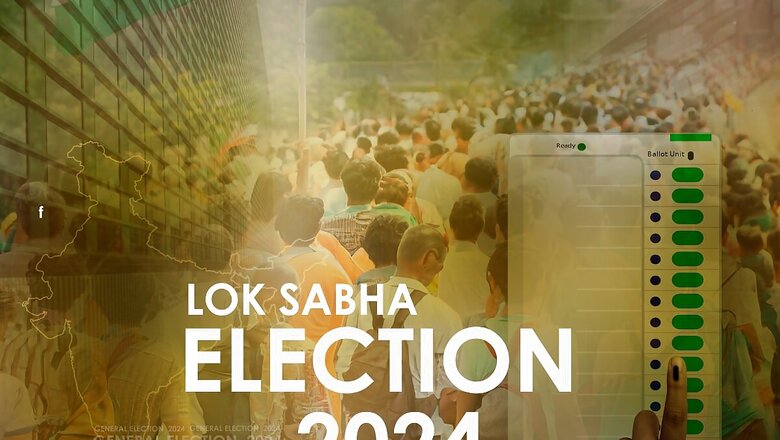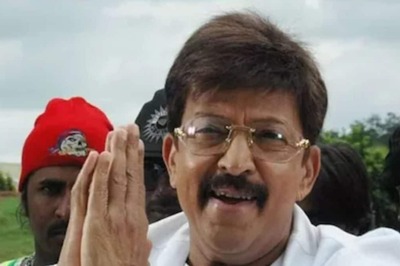
views
The Bastar-Jagdalpur (ST) Lok Sabha constituency represents the heart of the state’s tribal population. Designated as a Scheduled Tribe (ST) reserved constituency, it encompasses the entirety of Bastar-Jagdalpur district and Bijapur district, along with Dantewada, Narayanpur, and Sukma districts. Additionally, a portion of Kondagaon district falls under its jurisdiction. The constituency is further divided into eight assembly constituencies: Kondagaon(ST), Narayanpur(ST), Bastar(ST), Jagdalpur, Chitrakot(ST), Dantewada(ST), Bijapur(ST), Konta(ST). Voting for Lok Sabha election in Bastar will take place in the first phase on April 19 and the counting of votes will take place on June 4.
Key Voting Factors
From anti-incumbency to Modi factor, these are the factors that may affect voting in 2024 Lok Sabha elections 2024:
Anti-Incumbency
Deepak Baij, despite his prominent positions as MP and PCC President, faced significant anti-incumbency sentiment in Bastar leading up to the Lok Sabha elections. Baij’s domination from the seat has created resentment among party workers and the public. He has not allowed anyone else to rise within the party. Voters have been desiring a new face and fresh approach. Baij’s tenure did not meet the expectations of the people. His strained relationship with influential figures like Kawasi Lakhma, a six-time MLA, further weakened his position within the party.
Tribal Vote
Tribals constitute almost 70% of the population in Bastar. The major tribal population in Bastar is mostly divided in Hindu, Christians and Tribal religion. Tribals believe in voting to their utmost capacity and their votes are loyal to a party which continues for a long period of time. Women form 7 lakh votes in the constituency. In the last assembly elections, the tribal votes went to the BJP, and the trend is likely to continue this time.
Conversions
Religious conversion has emerged as a significant political issue. The area’s socio-cultural landscape is dominated by a tug-of-war between different religious groups. There have been concerted efforts to convert the tribal communities to Christianity. BJP has been particularly vocal against Christian missionaries, and has alleged forceful conversion of impoverished tribals.
Congress, on the other hand, has faced challenges in navigating this sensitive issue. Its messaging has been weak, trying to balance respect for tribal rights and religious freedom. Congress’ campaign had focused on development of ‘Devgudis’ (tribal village temples) and ‘Ghotuls’ (socio-culture centres of tribals) undertaken by Bhupesh Baghel government in the last five years.
Naxalism
Bastar has been one of the areas worst hit by Naxalism for decades, although the situation is steadily improving. While both the Congress and BJP recognize the gravity of the situation, their approaches and narratives have diverged significantly, often masking the complex realities at play. While BJP’s Mahesh Kashyap has been campaigning against Naxalism and has taken a hardline stance, Congress’s Kawasi Lakhma on the other hand has taken a cautious stance on Naxalism.
Modi Factor
Prime Minister Modi’s image as a strong and decisive leader resonates with a segment of the electorate. His government’s initiatives and welfare schemes have garnered support, and his personal charisma adds to his appeal. Voters who prioritize national development and security are likely to be swayed by the “Modi factor” and cast their votes in favour of the BJP candidate.
2019 Election Results and 2024 Candidates
Deepak Baij of the Congress had won the 2019 Lok Sabha election from the Bastar constituency. In 2024 polls, Congress High Command finally bit the bullet and decided to field Kawasi Lakhma as their candidate in Bastar. Lakhma is a seasoned politician with a strong connection to the region. He has an undefeated track record as MLA. Lakhma’s popularity stems from his ability to connect with the people on a personal level. However, unlike BJP’s highly organised campaign backed by central leadership, Lakhma has largely been left to campaign on his own. Due to personal issues between him and current MP Baij, Baij has not campaigned for Lakhma.
The BJP’s selection of Mahesh Kashyap as their candidate in Bastar represents a strategic shift towards fresh faces and a departure from established figures within the party. Despite several prominent names being considered, including former MPs and seasoned politicians such as Kedar Kashyap, and Dinesh Kashyap, the BJP opted for Mahesh, a young and dedicated member with a strong background in the Vishwa Hindu Parishad and Bajrang Dal.
Meanwhile, the traditional Congress-BJP fight has been queered by the entry of a wildcard Independent called Dr. Prakash Gota. Gota’s journey from personal tragedy to political candidacy embodies the frustrations and disillusionment felt by many within the Bastar tribal community. His decision to run as an independent candidate in the Lok Sabha elections stems from a series of events that exposed the failures of the state government and its neglect of the region’s challenges.
Key Election Issues
Connectivity and Infrastructure
Bastar’s infrastructure development has been picking up pace, but still lags far behind other parts of the country. The introduction of direct flights to Delhi from Bastar airport has significantly enhanced air travel options. The absence of direct train services to major cities like Raipur, the state capital, necessitates reliance on circuitous routes or alternative modes of transportation.
Since independence, there have been no trains from the region that reach Delhi, and local people feel cut off from the national capital. The ongoing construction of a railway line connecting Bastar to Raipur offers a glimmer of hope for the future. However, the project’s completion timeline remains uncertain.
Lack of Civic infrastructure
There is a distinct lack of civic infrastructure throughout Bastar. There are many villages, mostly in the tribal belt, which have not seen a school, hospital, or even electricity since independence. This is despite the fact that 7 out of 8 assembly constituencies in Bastar are ST seats with an ST MLA. People in some parts still do not have access to drinking water and consume water that is highly toxic due to the presence of heavy iron minerals and no resource to purify it.
Naxalism
The lack of basic infrastructure and services, such as schools, healthcare facilities, and employment opportunities, perpetuates a cycle of poverty and despair, driving individuals towards the Naxalite movement as a means of survival and resistance. The establishment of new security camps throughout the region has played a crucial role in curbing Naxalite activities. These camps not only provide a strong security presence but also serve as hubs for development and essential services. Most tribals have welcomed the camps set up by security forces.
The presence of camps has led to the opening of schools, hospitals, and other facilities, thereby addressing some of the root causes of discontent that fueled the Naxalite movement. But there is a far way to go.
Overall, 47 alleged Maoists have been killed in 2024, more than double the 22 rebels killed in 2023. But there has also been a counter-reaction from the insurgents, with 19 civilians killed by them in 2024, three of them being BJP leaders, with 41 civilians killed in 2023.
Corruption
Corruption is a pervasive issue in Bastar and a significant obstacle to development of the tribal population. Despite the region’s rich resources, such as iron ore extracted by NMDC, the benefits fail to reach the intended recipients. Funds allocated for tribal welfare and development projects often disappear into the pockets of corrupt officials and politicians. Schemes meant to improve infrastructure, healthcare, and education rarely reach the grassroots level, leaving the tribal communities deprived of essential services.
Agriculture
Agriculture forms the backbone of Bastar’s economy, with a majority of the population dependent on farming for their livelihood. However, the sector faces numerous challenges due to lack of resources, infrastructure, and government support, leading to dissatisfaction among farmers and making it a significant factor in the upcoming Lok Sabha elections.
Employment and Emigration
There is a dearth of employment opportunities in the area due to a lack of infrastructural development. According to ground reports, government led employment has completely halted in the region. As a result, people are forced to migrate to Raipur, Delhi and bordering states of Andhra Pradesh, Maharashtra and Odisha, for better employment opportunities. There is also a shortfall in the disposable income which pushes people to migrate. In a survey done in 2019, around 80% of households in Bastar are affected by migration.
Ram Mandir
The construction of Ram Mandir in Ayodhya has generated a positive response in Bastar and is likely to influence the Lok Sabha elections. Bastar holds a unique connection to the Ramayana, with the region considered part of Dandakaranya, where Lord Ram spent a considerable portion of his exile. The BJP stands to benefit from the positive sentiment surrounding its construction.
















Comments
0 comment